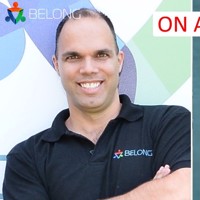Belong.Life Creates World's Largest Cancer Social Network

By Ed Miseta, Chief Editor, Clinical Leader

If you’re planning a trip to Barcelona and want to read feedback from others who have made the trip, it’s easy to locate those reviews. A quick visit to TripAdvisor or any other travel site would provide you with the desired feedback. But what if you wanted to interact with others who have cancer? What if you were considering participation in a clinical trial? Where would you go to interact with others or to get information on the trial experience?
The lack of an information source for cancer patients is what prompted Irad Deutsch to found Belong.Life alongside CEO Eliran Malki. Today Deutsch is CTO of the organization, which is billed as the world’s largest cancer social network.
“My team and I have been working in the IT industry for more than 14 years,” says Deutsch. “I was a big data specialist even before we even began calling it big data. My last company focused on big data analytics and was sold to EMC (later acquired by Dell.) Shortly thereafter, my mother was diagnosed with lung cancer. I started talking to people about the disease and soon realized that almost everyone has cancer in their family. I spoke to many patients and caregivers and realized almost everyone makes mistakes when they are forced to undertake that journey alone.”
The lack of a TripAdvisor in the clinical space led Deutsch to ponder how data and analytics could bridge the knowledge gap of patients and keep them up to speed on their illness and clinical trials.
“When we started developing Belong.Life in 2015, our goal was to help patients make more educated decisions,” states Deutsch. “Today, Belong is the world's largest social network for cancer patients and caregivers. We have over a quarter million patients around the globe, with 70 percent of them based in the U.S. Best of all, patients pay absolutely nothing to use our services.”
Make Expert Connections
 Irad Deutsch, Belong.Life |
Belong.Life provides patients with everything they need in one place. Forbes magazine has called Belong the GPS for cancer patients. The network’s goal is to help patients make educated decisions by providing them with connections and experts based on their profile.
“We have over 150 experts in the app,” says Deutsch. “For example, for breast cancer patients we have five to six experts along with radiation experts, a plastic surgeon, and a radiologist. A lung cancer patient would have access to a different set of experts. Patients have the opportunity to talk to those experts. Although they do not dispense medical advice, they can provide education and support throughout the course of treatment.”
Belong.Life can also connect patients with other patients. Hyper-personalization is done via machine learning. No two cancer patients are alike. Therefore, two patients with breast cancer might have different mutations and be on two different drugs. Using machine learning, Belong can connect patients with the same cancer type, staging, diagnosis, and mutation. It can even match patients who are on the same drug.
“We know patients enjoy connecting with other patients who have the same diagnosis,” notes Deutsch. “They want to connect with someone who has experienced what they are going through. They want to meet someone that can share their knowledge and wisdom.”
Tools Meet Patient Needs
Belong has a tool that patients can use to organize their documents and data without compromising their identity. When logging into the app, patients do not have to enter their name, as every patient uses a unique nickname.
“We have a sexuality group where people can anonymously talk about problems in their sexual life while undergoing chemotherapy,” says Deutsch. “Those are things they don't feel comfortable discussing with their family or physician. Therefore, they appreciate the ability to remain anonymous in those conversations.”
Belong also has a treatment navigator. This is a task management tool where patients can put in scheduled doctor appointments, MRIs, lab visits, and more. Cancer patients must keep track of many tasks and tests over time. The treatment navigator will remind them of appointments and allow them to hear from patients who have experienced the test.
“If a patient is scheduled for a biopsy tomorrow, today they will receive a notification along with advice from patients who have been through it,” says Deutsch. “The notification may tell them what will happen, what they need to be aware of, and how long the procedure will take. It's really comforting and empowering for patients to get that information prior to their visit.”
Finally, Belong has a clinical trial matching service. The service has already matched over 6,000 patients to a clinical trial. If a patient expresses the desire to participate in a trial, a trial coordinator will analyze the patient’s profile. When a trial is located, a human will get involved to help patients close the loop with the trial site.
Thus far Belong seems to be meeting its goal of educating and connecting patients. Deutsch reports that 70 percent of users remain in the app after one year, a high rate considering 25 percent of oncology patients are expected to succumb to their illness every year.
Benefits To Pharma
Belong launched in 2015 and already Deutsch and Malki are being asked why the app is only for cancer patients. The app specializes in patient engagement, which can extend across multiple therapies. In response to these requests, his team created the Belong.Life cloud, where multiple therapeutic areas can be hosted. A second therapeutic area is already in testing and is expected to launch in early 2020. Three more diseases are on the horizon and are expected to launch by the end of 2020. Deutsch hopes to replicate the success Belong has had in oncology.
If a pharma or biotech company is recruiting patients for a trial, Belong can help with that process as well. Deutsch notes the network has three main business models. Number one is allowing sites to use the patient engagement feature for their patients. For example, if a hospital or site wanted to better engage with its patients, they could use the Belong app rather than develop their own. The app would have the site or hospital’s own logo on it but be powered by Belong. This model can also be used by advocacy groups.
The second model revolves around research. Belong conducts research and has published 10 papers that have been presented at oncology conventions and conferences. Belong never shares individual data, just trends and summarized data. Much of the data comes from patient surveys. “We produce a lot of research based on real world data,” says Deutsch. “This research is powerful and helps the industry drive research.”
The third model relates to clinical trial matching. If a sponsor company wanted to open a site in Israel, Belong could search its database and see if there are any patients in that country meeting the inclusion/exclusion criteria.
“We help sponsor companies locate sites and patients,” says Deutsch. “Regulations differ from country to country on what you can and can’t do, so we will also work with local regulators to ensure sponsors comply with those regulations. If we find a patient who is interested in a trial, we start the on-boarding process, close the loop, and receive a fee for that service.”
A Home-Grown Effort
The Belong app and machine learning algorithms were developed inhouse. Initially Belong tried to leverage off-the-shelf products but had a problem with the natural language processing (NLP) solutions. According to Deutsch, they were more suitable for textbooks, professional literature, and documents with good punctuation and grammar. Unfortunately, medical documents and inclusion/exclusion criteria often do not have good punctuation. “Sometimes they are just scribbled notes and buzzwords,” he says. “For that reason, we opted to start from scratch and develop a solution of our own.”
Deutsch notes the development process took about three years, but Belong now has a NLP solution that does 80 percent of the heavy lifting. Belong receives clinical file databases in a digitized form, tears apart the files, and rebuilds them in a way that can be readable by NLP.
“Ten years ago, we were looking for lung cancer patients with metastasis in their brain,” adds Deutsch. “Now we're looking for lung cancer patients, with metastasis in the brain, with a tumor no bigger than two millimeters, and a nodule no bigger than three centimeters on their right lung. Cancer research is getting more complex. As we continue to move into other therapeutic areas, we will continue to crack the atom of patient engagement, which has been a challenge. I lost my mother because we didn’t have enough data. I want to make sure that everyone who experiences any chronic or acute illness will have better data and guidance than she did. Our goal is to continue to help patients make better educated and more informed decisions.”
